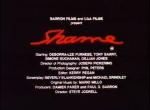AustLit
The material on this page is available to AustLit subscribers. If you are a subscriber or are from a subscribing organisation, please log in to gain full access. To explore options for subscribing to this unique teaching, research, and publishing resource for Australian culture and storytelling, please contact us or find out more.
Latest Issues
AbstractHistoryArchive Description
In the vein of stranger-comes-to-town westerns, lawyer Asta Cadell (Deborah Lee Furness) is forced to stop in the small country town of Ginaborak to await parts for her motorcycle. The men of the town act very aggressively. The women cower. Asta is offered a place to stay by Tim Curtis (Tony Barry) a local mechanic and learns of the rape of his daughter Lizze (Simone Buchanan) the previous evening. As Asta befriends Lizze, she is horrified to discover that the men repeatedly gang rape the women of Ginborak.
Source: Reading Room, 'Shame', http://wwwmcc.murdoch.edu.au/ReadingRoom/film/dbase/2003/shame.htm (Sighted 7/10/11)
Publication Details of Only Known VersionEarliest 2 Known Versions of
Works about this Work
-
Steve Jodrell : No Shame
2018
single work
column
— Appears in: FilmInk , 26 June 2018; -
Regionalism in Audiovisual Production : The Case of Queensland
1994
single work
essay
— Appears in: Queensland Review , June vol. 1 no. 1 1994; (p. 47-54) 'A great deal has been made ofthe boom in audiovisual production based in southern Queensland (and to some extent in northern Queensland)in the 1990s. This follows a pattern throughout the so-called 'revival' period (since the early 1970s) in Australia which has seen successive moments of regional upsurge. In the 1970s, it was South Australia, under the energetic leadership of the South Australian Film Corporation, that saw many of the best feature films and several of the early historical mini-series of the early revival period made in that state (see, for example, Moran). During the early to mid-1980s,Western Australia, with the locationofbold production houses such as Barron Films and strong independent documentary traditions, offered robust regional opportunities, culminating in such memorable films as Shame and Fran.' (Introduction)
-
Steve Jodrell : No Shame
2018
single work
column
— Appears in: FilmInk , 26 June 2018; -
Regionalism in Audiovisual Production : The Case of Queensland
1994
single work
essay
— Appears in: Queensland Review , June vol. 1 no. 1 1994; (p. 47-54) 'A great deal has been made ofthe boom in audiovisual production based in southern Queensland (and to some extent in northern Queensland)in the 1990s. This follows a pattern throughout the so-called 'revival' period (since the early 1970s) in Australia which has seen successive moments of regional upsurge. In the 1970s, it was South Australia, under the energetic leadership of the South Australian Film Corporation, that saw many of the best feature films and several of the early historical mini-series of the early revival period made in that state (see, for example, Moran). During the early to mid-1980s,Western Australia, with the locationofbold production houses such as Barron Films and strong independent documentary traditions, offered robust regional opportunities, culminating in such memorable films as Shame and Fran.' (Introduction)
Awards
Last amended 30 Sep 2019 16:06:21
Settings:
- Western Australia,
Export this record





